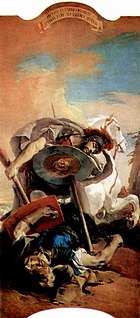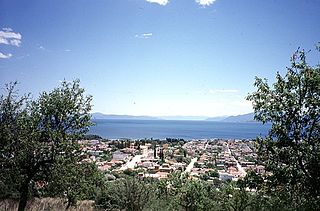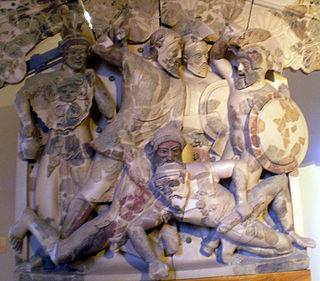Thebes may refer to one of the following places:

Thebes is a city in Boeotia, central Greece. It played an important role in Greek myths, as the site of the stories of Cadmus, Oedipus, Dionysus and others. Archaeological excavations in and around Thebes have revealed a Mycenaean settlement and clay tablets written in the Linear B script, indicating the importance of the site in the Bronze Age.

Thebes, known to the ancient Egyptians as Waset, was an ancient Egyptian city located along the Nile about 800 kilometers (500 mi) south of the Mediterranean. Its ruins lie within the modern Egyptian city of Luxor. Thebes was the main city of the fourth Upper Egyptian nome and was the capital of Egypt mainly during the Middle Kingdom and the New Kingdom. It was close to Nubia and the Eastern Desert, with its valuable mineral resources and trade routes. It was a cult center and the most venerated city of ancient Egypt during its heyday. The site of Thebes includes areas on both the eastern bank of the Nile, where the temples of Karnak and Luxor stand and the city proper was situated; and the western bank, where a necropolis of large private and royal cemeteries and funerary complexes can be found.

Oedipus was a mythical Greek king of Thebes. A tragic hero in Greek mythology, Oedipus accidentally fulfilled a prophecy that he would end up killing his father and marrying his mother, thereby bringing disaster to his city and family.

Seven Against Thebes is the third play in an Oedipus-themed trilogy produced by Aeschylus in 467 BC. The trilogy is sometimes referred to as the Oedipodea. It concerns the battle between an Argive army led by Polynices and the army of Thebes led by Eteocles and his supporters. The trilogy won the first prize at the City Dionysia. The trilogy's first two plays, Laius and Oedipus, as well as the satyr play Sphinx, are no longer extant.

In Greek mythology, Eteocles was a king of Thebes, the son of Oedipus and either Jocasta or Euryganeia. The name is from earlier *Etewoklewes (Ἐτεϝοκλέϝες), meaning "truly glorious". Tawagalawas is thought to be the Hittite rendition of the name. Oedipus killed his father Laius and married his mother without knowing his relationship to either. When the relationship was revealed, he was expelled from Thebes. The rule passed to his sons Eteocles and Polynices. However, because of a curse from their father, the two brothers did not share the rule peacefully and died as a result, ultimately killing each other in battle for control of the city. Upon his death, Eteocles was succeeded by his uncle, Creon.

In Greek mythology, Polynices was the son of Oedipus and Jocasta and the younger brother of Eteocles. When his father, Oedipus, was discovered to have killed his father and married his mother, he was expelled from Thebes, leaving his sons Eteocles and Polynices to rule. Because of a curse put on them by their father Oedipus, the two sons did not share the rule peacefully and died as a result, killing each other in battle for control over Thebes.
Creon, is a figure in Greek mythology best known as the ruler of Thebes in the legend of Oedipus. He had four sons and three daughters with his wife, Eurydice : Henioche, Pyrrha, Megareus, Lycomedes and Haimon. Creon and his sister, Jocasta, were descendants of Cadmus and of the Spartoi. He is sometimes considered to be the same person who purified Amphitryon of the murder of his uncle Electryon and father of Megara, first wife of Heracles.

Epaminondas was a Theban general and statesman of the 4th century BC who transformed the Ancient Greek city-state of Thebes, leading it out of Spartan subjugation into a pre-eminent position in Greek politics. In the process he broke Spartan military power with his victory at Leuctra and liberated the Messenian helots, a group of Peloponnesian Greeks who had been enslaved under Spartan rule for some 230 years after being defeated in the Messenian War ending in 600 BC. Epaminondas reshaped the political map of Greece, fragmented old alliances, created new ones, and supervised the construction of entire cities. He was also militarily influential and invented and implemented several major battlefield tactics.
In Greek mythology and history, Promachus is a name that refers to several different people.

Thebe also known as Jupiter XIV, is the fourth of Jupiter's moons by distance from the planet. It was discovered by Stephen P. Synnott in images from the Voyager 1 space probe taken on March 5, 1979, while making its flyby of Jupiter. In 1983, it was officially named after the mythological nymph Thebe.

Greek National Road 44 is a single carriageway road in central Greece. It connects Thebes with Karystos on southern Euboea, via Chalcis and Eretria. The total length of the GR-44 is nearly 160 km. The highway lies in the regional units of Boeotia and Euboea.

Nea Anchialos is a town and a former municipality in Magnesia, Thessaly, Greece. Since the 2011 local government reform it is part of the municipality Volos, of which it is a municipal unit. It is situated southwest of Volos and north of Almyros, on the coast of the Pagasetic Gulf. It is located on the national highway Athens-Lamia-Volos. The area of the municipal unit is 80.462 km2 (31.067 sq mi) and its population 6,819 people (2011).

The Theban Cycle is a collection of four lost epics of ancient Greek literature which related the mythical history of the Boeotian city of Thebes. They were composed in dactylic hexameter verse and were probably written down between 750 and 500 BC.
In Greek mythology, Megara was the oldest daughter of Creon, king of Thebes and possibly, Eurydice. She was the sister of Menoeceus (Megareus), Lycomedes, Haemon, and Pyrrha.

Classical Greece was a period of around 200 years in Greek culture. This Classical period saw the annexation of much of modern-day Greece by the Persian Empire and its subsequent independence. Classical Greece had a powerful influence on the Roman Empire and on the foundations of Western civilization. Much of modern Western politics, artistic thought, scientific thought, theatre, literature, and philosophy derives from this period of Greek history. In the context of the art, architecture, and culture of Ancient Greece, the Classical period corresponds to most of the 5th and 4th centuries BC. The Classical period in this sense follows the Greek Dark Ages and Archaic period and is in turn succeeded by the Hellenistic period.

Antigone is a 1961 Greek film adaptation of the Ancient Greek tragedy Antigone by Sophocles. It stars Irene Papas in the title role and was directed by Yorgos Javellas.

European route E 962 is a European B class road in Greece, connecting the city Eleusis – Thebes.
Thebe is a feminine name mentioned several times in Greek mythology, in accounts that imply multiple female characters, four of whom are said to have had three cities named Thebes after them:

















